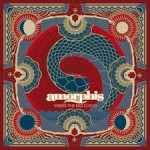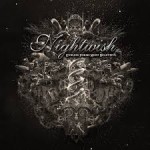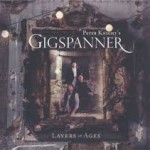Into the top five, with only the Album of the Year to go. Two or three of these albums could easily been the album of the year themselves. Again, they’re not in any order, consider them all equal 2nd.
Amorphis – Under the Red Cloud
 What is it about Scandinavia and metal? A disproportionate number of the most imaginative and innovative metal of recent years has come from Sweden, Norway and especially Finland. Amorphis hail from the last of those nations, and have delivered a quite remarkable record which cannot be pigeonholed in any of metal’s narrow subgenres. There are moments of death metal, folk metal and gothic rock, and the occasional nod to 70s classic rock. It can be piledrivingly heavy at times, but always hugely melodic, with melodies that owe as much to the twin guitars as the vocals. Like the best metal bands they demonstrates superb use of dynamics. Many songs combine clear vocals with death growls, often using one style on the verse and the other on the chorus. As a contemporary metal album this record is absolutely state of the art.
What is it about Scandinavia and metal? A disproportionate number of the most imaginative and innovative metal of recent years has come from Sweden, Norway and especially Finland. Amorphis hail from the last of those nations, and have delivered a quite remarkable record which cannot be pigeonholed in any of metal’s narrow subgenres. There are moments of death metal, folk metal and gothic rock, and the occasional nod to 70s classic rock. It can be piledrivingly heavy at times, but always hugely melodic, with melodies that owe as much to the twin guitars as the vocals. Like the best metal bands they demonstrates superb use of dynamics. Many songs combine clear vocals with death growls, often using one style on the verse and the other on the chorus. As a contemporary metal album this record is absolutely state of the art.
Karnataka – Secrets of Angels
 Karnataka’s fifth studio album is a very different beast from 2007′s “The Gathering Light”, as much so as that album was from “Delicate Flame of Desire”. But the three were the products of three very different bands. The newest incarnation of Karnataka with Hayley Griffiths on vocals and Cagri Tozluoglu on keys have come up with a huge-sounding record with more than a hint of European symphonic metal about it, with recurring lyrical themes of adultery and betrayal. The early part of the album is filled with hook-laden potential singles. Then it closes with the twenty-minute title track which combines evocative celtic soundscapes with massive symphonic rock crescendos and features a guest appearance from Troy Donockley. With this record Karnataka managed to take on the likes of Nightwish and beat them at their own game, which is no mean achievement.
Karnataka’s fifth studio album is a very different beast from 2007′s “The Gathering Light”, as much so as that album was from “Delicate Flame of Desire”. But the three were the products of three very different bands. The newest incarnation of Karnataka with Hayley Griffiths on vocals and Cagri Tozluoglu on keys have come up with a huge-sounding record with more than a hint of European symphonic metal about it, with recurring lyrical themes of adultery and betrayal. The early part of the album is filled with hook-laden potential singles. Then it closes with the twenty-minute title track which combines evocative celtic soundscapes with massive symphonic rock crescendos and features a guest appearance from Troy Donockley. With this record Karnataka managed to take on the likes of Nightwish and beat them at their own game, which is no mean achievement.
Chantel McGregor – Lose Control
 It been four years since the Yorkshire guitarist and singer-songwriter released her début album, but the follow-up not only proved to be well worth the wait, but is a very different sort of record. With a “Southern Gothic” theme it’s heavier, darker and far more song-focussed, with elements of grunge and progressive rock. There’s more emphasis on memorable riffs than on extended guitar wig-outs; she takes a less-is-more approach to soloing. Hard rockers alternate with delicate acoustic numbers, and the album closes with the ambitious kaleidoscopic epic “Walk on Land”.
It been four years since the Yorkshire guitarist and singer-songwriter released her début album, but the follow-up not only proved to be well worth the wait, but is a very different sort of record. With a “Southern Gothic” theme it’s heavier, darker and far more song-focussed, with elements of grunge and progressive rock. There’s more emphasis on memorable riffs than on extended guitar wig-outs; she takes a less-is-more approach to soloing. Hard rockers alternate with delicate acoustic numbers, and the album closes with the ambitious kaleidoscopic epic “Walk on Land”.
Bruce Soord
 The self-titled solo album by the Pineapple Thief mainman is a thing of beauty, with echoes of Guy Garvey, recent Anathema and Steven Wilson at his less bombastic. It’s an album of soaring atmospheric soundscapes, often semi-acoustic but always hugely melodic, with arrangements varying from acoustic minimalism to richly layered. It takes one unexpected sharp left turn early on with the disco-funk of “The Odds”, but the gorgeously dreamy “Born in Delusion” and “Familiar Patterns” are far more representative of the album. Quite different in mood to The Pineapple Thief, but a very enjoyable record.
The self-titled solo album by the Pineapple Thief mainman is a thing of beauty, with echoes of Guy Garvey, recent Anathema and Steven Wilson at his less bombastic. It’s an album of soaring atmospheric soundscapes, often semi-acoustic but always hugely melodic, with arrangements varying from acoustic minimalism to richly layered. It takes one unexpected sharp left turn early on with the disco-funk of “The Odds”, but the gorgeously dreamy “Born in Delusion” and “Familiar Patterns” are far more representative of the album. Quite different in mood to The Pineapple Thief, but a very enjoyable record.





 Donald Trump frightens me.
Donald Trump frightens me. The Norwegian six-piece pick up where they left off with last year’s “Demon”. The vibe resembles late period Talk Talk crossed with Storm Corrosion, sinister atmospheric soundscapes making prominent use of violin and the occasional irruptions of central European folk motifs. But be careful when you play it. The sound resembling modem noises at the very end of “Molok Rising” is a code which may destroy the universe.
The Norwegian six-piece pick up where they left off with last year’s “Demon”. The vibe resembles late period Talk Talk crossed with Storm Corrosion, sinister atmospheric soundscapes making prominent use of violin and the occasional irruptions of central European folk motifs. But be careful when you play it. The sound resembling modem noises at the very end of “Molok Rising” is a code which may destroy the universe. Lonely Robot is the project from John Mitchell of It Bites, Arena and Frost* fame, with a all-star supporting cast including Nick Beggs, Go West’s Peter Cox, Marillion’s Steve Hogarth, Heather Findlay and Kim Seviour. The end result is a varied but hugely impressive album. It goes from dense guitar-heavy industrial prog-metal to gorgeous ballads to uptempo 80s-style pop-rock, with imaginative arrangements that frequently veer off in unexpected directions.
Lonely Robot is the project from John Mitchell of It Bites, Arena and Frost* fame, with a all-star supporting cast including Nick Beggs, Go West’s Peter Cox, Marillion’s Steve Hogarth, Heather Findlay and Kim Seviour. The end result is a varied but hugely impressive album. It goes from dense guitar-heavy industrial prog-metal to gorgeous ballads to uptempo 80s-style pop-rock, with imaginative arrangements that frequently veer off in unexpected directions. The latest release by the Finnish masters of symphonic metal marks the studio début of lead singer Floor Jansen, and is also the first to feature celtic folk multi-instrumentalist Troy Donockley as a full member of the band. It’s rather heavier than their previous “Imaginaerum“, thought the straight-up metal numbers end up less interesting than the soaring ballads and folk-rock workouts. It might have done without the spoken word parts from the odious Richard Dawkins, though at least he’s talking about evolutionary biology here.
The latest release by the Finnish masters of symphonic metal marks the studio début of lead singer Floor Jansen, and is also the first to feature celtic folk multi-instrumentalist Troy Donockley as a full member of the band. It’s rather heavier than their previous “Imaginaerum“, thought the straight-up metal numbers end up less interesting than the soaring ballads and folk-rock workouts. It might have done without the spoken word parts from the odious Richard Dawkins, though at least he’s talking about evolutionary biology here. Gigspanner are an acoustic trio led by former Steeleye Span fiddle player Peter Knight, and Layers of Ages sees imaginative arrangements of traditional folk numbers. Though not an instrumental record, Knight’s evocative and lyrical violin playing is the heart of the sound, full of melody and emotion. Much like contemporary jazz, some modern folk has a lot of appeal for fans of progressive rock wanting to venture out of their comfort zone, and this record is a very good place to start.
Gigspanner are an acoustic trio led by former Steeleye Span fiddle player Peter Knight, and Layers of Ages sees imaginative arrangements of traditional folk numbers. Though not an instrumental record, Knight’s evocative and lyrical violin playing is the heart of the sound, full of melody and emotion. Much like contemporary jazz, some modern folk has a lot of appeal for fans of progressive rock wanting to venture out of their comfort zone, and this record is a very good place to start. Steven Wilson’s third release following the dissolution of Porcupine Tree is an ambitious concept album about isolation that’s drawn comparisons with Pink Floyd’s “The Wall” and Marillion’s “Brave”. He reins in the wind-driven jazz-rock elements in favour of more guitar-centred sound that’s closer to the spirit of Porcupine Tree than earlier solo releases, going from stripped-back minimalism that evokes XTC to dense layered prog-metal workouts. It’s perhaps not quite as consistently strong as “The Raven That Refused to Sing”, but nevertheless contains many powerful moments.
Steven Wilson’s third release following the dissolution of Porcupine Tree is an ambitious concept album about isolation that’s drawn comparisons with Pink Floyd’s “The Wall” and Marillion’s “Brave”. He reins in the wind-driven jazz-rock elements in favour of more guitar-centred sound that’s closer to the spirit of Porcupine Tree than earlier solo releases, going from stripped-back minimalism that evokes XTC to dense layered prog-metal workouts. It’s perhaps not quite as consistently strong as “The Raven That Refused to Sing”, but nevertheless contains many powerful moments.